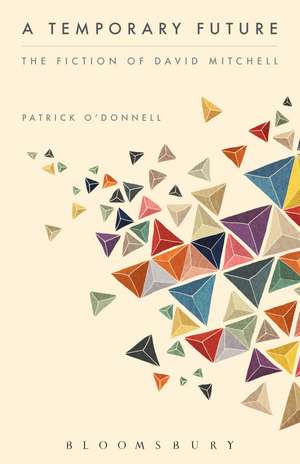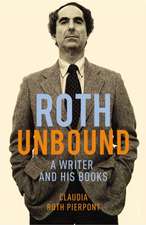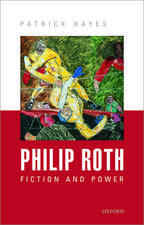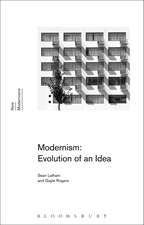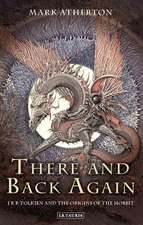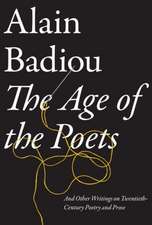A Temporary Future: The Fiction of David Mitchell
Autor Professor Patrick O'Donnellen Limba Engleză Hardback – 25 mar 2015
| Toate formatele și edițiile | Preț | Express |
|---|---|---|
| Paperback (1) | 190.68 lei 3-5 săpt. | |
| Bloomsbury Publishing – 25 mar 2015 | 190.68 lei 3-5 săpt. | |
| Hardback (1) | 713.29 lei 6-8 săpt. | |
| Bloomsbury Publishing – 25 mar 2015 | 713.29 lei 6-8 săpt. |
Preț: 713.29 lei
Preț vechi: 829.41 lei
-14% Nou
Puncte Express: 1070
Preț estimativ în valută:
136.49€ • 148.72$ • 115.01£
136.49€ • 148.72$ • 115.01£
Carte tipărită la comandă
Livrare economică 23 aprilie-07 mai
Preluare comenzi: 021 569.72.76
Specificații
ISBN-13: 9781441171221
ISBN-10: 1441171223
Pagini: 224
Ilustrații: black & white illustrations
Dimensiuni: 140 x 216 x 14 mm
Greutate: 0.41 kg
Editura: Bloomsbury Publishing
Colecția Bloomsbury Academic
Locul publicării:New York, United States
ISBN-10: 1441171223
Pagini: 224
Ilustrații: black & white illustrations
Dimensiuni: 140 x 216 x 14 mm
Greutate: 0.41 kg
Editura: Bloomsbury Publishing
Colecția Bloomsbury Academic
Locul publicării:New York, United States
Caracteristici
Wide-ranging introduction to Mitchell's fiction, his style and the major themes of his novels
Notă biografică
Patrick O'Donnell is Professor of English at Michigan State University, USA. He is the author or editor of 12 books, including The American Novel Now: Contemporary American Fiction Since 1980 (2010), Latent Destinies: Cultural Paranoia and Contemporary U.S. Narrative (2000) and The Encyclopedia of Twentieth Century American Fiction (co-edited with David W. Madden & Justus Nieland, 2011).
Cuprins
AcknowledgementsIntroduction: Many Worlds, Real TimeChapter One: A Company of Strangers: ghostwrittenChapter Two: Metropolitan Traumas: number9dreamChapter Three: The Reach of History: Cloud AtlasChapter Four: Timepiece: blackswangreenChapter Five: Minor Histories: The Thousand Autumns of Jacob de ZoetChapter Six: The Bone ClocksEpilogue: Toward a Fiction of the FutureIndex
Recenzii
A Temporary Future provides a thought-provoking assessment of the novels-certainly much more than simply the "introduction" that O'Donnell claims it is-and, like any good work of criticism, it makes us eager to return to the novels themselves and read them in light of our new understanding.
O'Donnell is the first to explore the complete works to date of British novelist David Mitchell ... [He] makes a careful and clear argument for Mitchell's project as well as his place in literature . It will appeal most to literature students, academics, and literary critics.
Like Mitchell's novels, this study is itself 'a capacious assemblage,' drawing on O'Donnell's impeccable grasp of multiple literary traditions, of diverse critical frameworks, and his sensitive readings of Mitchell's characters' 'spontaneously associative mental threads.' These elements come together to make this a pioneering study by an accomplished critic, which offers not only comprehensive readings of Mitchell's work but also extends and expands our understanding of what a cosmopolitan style might achieve, and how the hybrid novel might evolve in our temporary future.
Patrick O'Donnell has produced an authoritative account of the novels of David Mitchell in A Temporary Future. Uncovering the poetic interplay of mutable time signatures in Mitchell's work, O'Donnell presents the reader with an elegant set of interconnected readings of his oeuvre to date. Mitchell has emerged as one of the most important British writers in recent years, and this book will serve as an invaluable critical introduction to his fiction. O'Donnell has captured the fluidity and breathless energy of his novels - throughout this study, Mitchell's preoccupation with pulsing, intersecting times, realities and worlds shines through. This is a richly suggestive account, and a book that anyone with an interest in contemporary fiction and literary representations of temporality will want to read.
This is indispensable reading for those who want to orient themselves not only to Mitchell's individual works but also to the connections across those works. O'Donnell is attuned to the book-ness of Mitchell's writing: its way of reflecting on the formats and media of contemporary fiction, right down to the typeface or visual experience of the page. In Mitchell's fiction of the future, O'Donnell heralds the future of contemporary fiction.
O'Donnell is the first to explore the complete works to date of British novelist David Mitchell ... [He] makes a careful and clear argument for Mitchell's project as well as his place in literature . It will appeal most to literature students, academics, and literary critics.
Like Mitchell's novels, this study is itself 'a capacious assemblage,' drawing on O'Donnell's impeccable grasp of multiple literary traditions, of diverse critical frameworks, and his sensitive readings of Mitchell's characters' 'spontaneously associative mental threads.' These elements come together to make this a pioneering study by an accomplished critic, which offers not only comprehensive readings of Mitchell's work but also extends and expands our understanding of what a cosmopolitan style might achieve, and how the hybrid novel might evolve in our temporary future.
Patrick O'Donnell has produced an authoritative account of the novels of David Mitchell in A Temporary Future. Uncovering the poetic interplay of mutable time signatures in Mitchell's work, O'Donnell presents the reader with an elegant set of interconnected readings of his oeuvre to date. Mitchell has emerged as one of the most important British writers in recent years, and this book will serve as an invaluable critical introduction to his fiction. O'Donnell has captured the fluidity and breathless energy of his novels - throughout this study, Mitchell's preoccupation with pulsing, intersecting times, realities and worlds shines through. This is a richly suggestive account, and a book that anyone with an interest in contemporary fiction and literary representations of temporality will want to read.
This is indispensable reading for those who want to orient themselves not only to Mitchell's individual works but also to the connections across those works. O'Donnell is attuned to the book-ness of Mitchell's writing: its way of reflecting on the formats and media of contemporary fiction, right down to the typeface or visual experience of the page. In Mitchell's fiction of the future, O'Donnell heralds the future of contemporary fiction.
